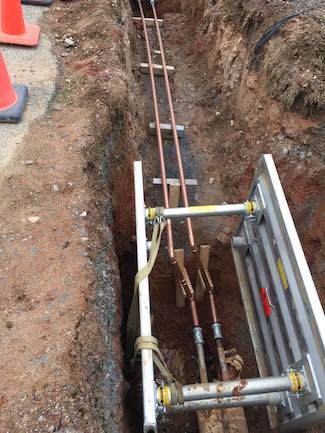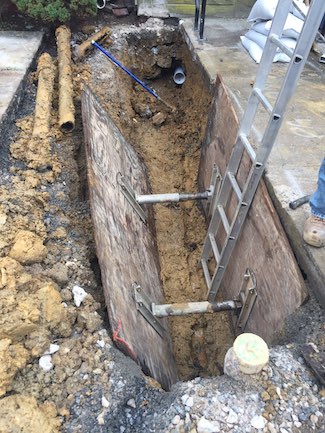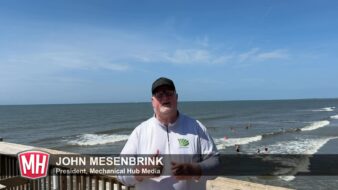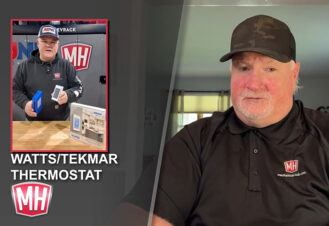
The shallow trench box was employed because the walls were unstable following soil saturation from a year’s long hydronic leak. Didn’t trust the dirt, but no trench collapse happened. Waste of time and money? No, no, and no. Why not? Think about the need to kneel beside the piping to make the connections and braze the copper joints then add insulation. That puts the employee below the top of the trench where a collapse would have the potential to engulf the employee under several tons of earth. The copper piping runs to an outdoor makeup air handler with 100% outdoor air for the laboratory at the city sewage treatment plant. Image: Dave Yates
Buffalo Grove, Ill. — This past week, a tragedy occurred in the plumbing industry. On a jobsite, in someone’s front yard, a plumber died as a result of being buried alive due to a trench collapse. Twenty-seven-year-old Nikodem Zaremba was killed when the 8-ft.-deep trench he was working in collapsed on top of him. Zaremba was co-owner of Rooter Solutions.
OSHA is currently looking into this and has opened a formal investigation into the circumstances. According to initial results, the site did not appear to have the necessary safety precautions to keep the accident from happening.
On the recent Appetite for Construction podcast, Mechanical Hub friend, Dave Yates, told the story back in 1972—the first week on the job as a young tradesman—he was called to a nearby jobsite to help three plumbers to safety by digging them out of a collapsed trench. Unfortunately, one was already dead when he arrived. The other, a couple of feet away, was buried up to his armpits. They were able to extract the other two workers to safety.

This muddy ditch was for an inner-city library where the cast iron was rotted out and raw sewage was running into their basement. A muddy sloppy mess and we were ensuring no mudslides into the ditch. Not deep enough to require shoring, but OSHA does state the ditch/trench is to be inspected by a “qualified” person to determine if shoring is needed when ditch/trench is under 5′ deep. Image: Dave Yates
Survive or not, says Yates, being buried in dirt for an extended period of time can cause major health issues, including complications called Compartment Syndrome, a condition that occurs when the pressure within a compartment increases, restricting the blood flow to the area and potentially damaging the muscles and nearby nerves.
“Victims of a cave-in are in grave danger even if they are not totally buried, and can still breathe. Circulatory problems, Compartment Syndrome, clotting, and other issues can be life threatening or cause serious injury,” commented Tim Doran on Facebook.
Listen below to hear Dave’s conversation on the podcast:
From 1979 to 2019, Yates had employees and bore a responsibility to ensure they had full-time work and would return home to their families safe each day. “Most had never worked for anyone who required the use of shoring. Even our excavators did not have shoring when we first looked at using them as subcontractors. Without either renting it or buying their own, they could not work for us. I told them they could charge extra for shoring because it was an expense for them just like any other job site cost,” said Yates.
Fifty years later, from Yates’ recollection of that day to present day, it seems that there are those that still don’t heed the best given. We pray for Zaremba’s family, and stay safe out there.



